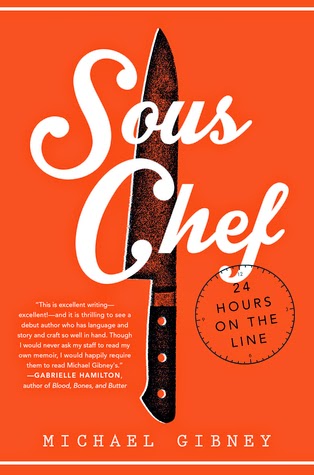Sous Chef by Michael Gibney
A friend handed me a book the other day. "Here," she said. "I read this in like a day. I think you'll enjoy it."
The book flew. In well-written prose we are given access to the life of a chef––minus the F-words that were sprinkled liberally in books like the ones by Anthony Bourdain. It has believable dialogue and I was pulled along in the action. So, I did like it, but...not entirely.
There are days when I think I want to learn how to cook like a pro, maybe even spend my days working in a real-life kitchen. But, I know that while I love food, I have always been more of a player. I like talking about food, eating food, making dinner for friends, shopping and tinkering with recipes. But the life of a chef is something I can't envision for myself. Frankly, I don't think I'm tough enough. I certainly can't do it as relayed in this book.
Sous Chef, the second book from Michael Gibney, walks the line between fiction and non fiction, an interesting new genre that may need a name. Non fiction novel? Fictional memoir? Non fiction-ish? Whatever the name, this book is an amalgam of many days in a kitchen with the goal of giving the reader an idea of what it's like to work for one full day in a busy, high-end New York City restaurant.
Gibney is an accomplished chef. He's been working in kitchen's since he was 16. He's also a writer, as so many chefs seem to be revealing these days. He even has an MFA from Columbia to back it up. The story of the day unfolds slowly, with Gibney, the morning sous chef, opening the restaurant for business. He strides around the empty kitchen, using the set up to detail to the reader how a kitchen is structured. This early section of the book didn't grab me. The descriptions read like a manual and I found myself skimming rather than reading. This is accentuated by his use of the second person: You. Which both holds me away at arms length and gives the book a somewhat detached feeling.
When Gibney finally dropped me into the action I was rewarded with well-developed characters, the chef, the second sous chef, and––one of the strongest elements of the book––the nicely fleshed out staff cooks, waitstaff and support workers. This cast could have been swept aside, but they weren't. Gibney shows the soul of a kitchen, which isn't the chef, it's everyone from the dishwasher to the waiters to the line cooks working as one well-orchestrated unit. The book shows us this, and it's where Gibney gets to illustrate his knowledge, and his value.
I learned a few things reading this book, which in the end is what we're all looking for, right? I know how to tell if a fish is done without hacking it open (see page 76) and how to baste fish in butter to get all of the protein to the same temp at the same time (like in sous vide) but in a pan on a flame. It's called arrosé, and it requires butter, which is one of the ingredients a kitchen uses three times more of then a home cook. I might be underestimating. I also learned the word soigné, which Gibney used to refer to a perfectly plated dinner. Also, to himself, when he was doing a truly good job.
The book isn't 100% soigné, but it hits the mark more than enough to suggest reading it.

